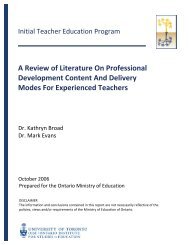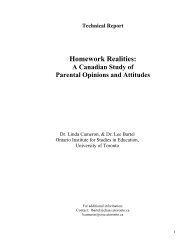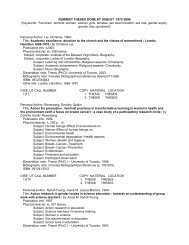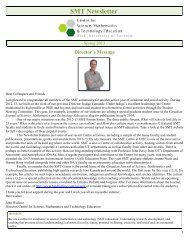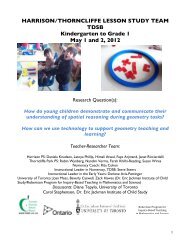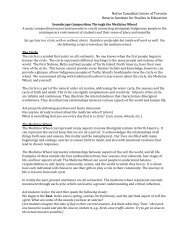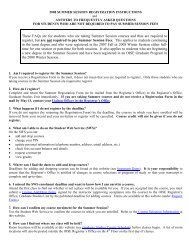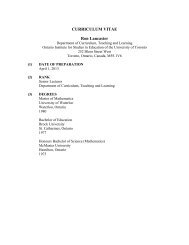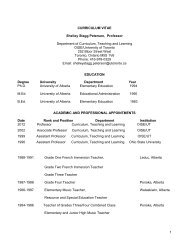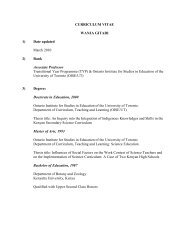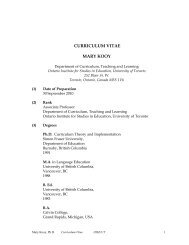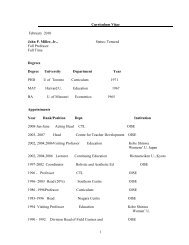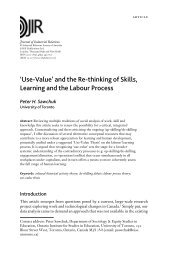The Ontario Curriculum, Grades 9-12 - Ministère de l'éducation ...
The Ontario Curriculum, Grades 9-12 - Ministère de l'éducation ...
The Ontario Curriculum, Grades 9-12 - Ministère de l'éducation ...
You also want an ePaper? Increase the reach of your titles
YUMPU automatically turns print PDFs into web optimized ePapers that Google loves.
needs of remote communities had on innovations in the <strong>de</strong>velopment of off-grid energy<br />
sources? What types of products have been <strong>de</strong>veloped in response to the health threats<br />
resulting from ozone <strong>de</strong>pletion?<br />
B2. Developing Skills of Investigation and Communication<br />
B2. investigate a range of perspectives that have contributed to scientific knowledge about the<br />
environment, and how scientific knowledge and procedures are applied to address<br />
contemporary environmental problems<br />
B2.1 use appropriate terminology related to the application of scientific knowledge and<br />
procedures to environmental issues, including, but not limited to: fact, inference,<br />
paradigm, objectivity, and causality [C]<br />
B2.2 plan and conduct a laboratory inquiry to test a scientific procedure used to address a<br />
contemporary environmental problem (e.g., an oil spill, acid precipitation) [IP, PR, AI]<br />
B2.3 investigate, through research or using case studies or computer simulation, how scientific<br />
knowledge and procedures are applied to address a particular contemporary<br />
environmental issue (e.g., scientific data on the needs and habits of endangered species<br />
are used to <strong>de</strong>velop plans to protect threatened species; life-cycle assessments are<br />
conducted to <strong>de</strong>termine the total environmental impact of a consumer product) [PR, AI]<br />
B2.4 use a research process to investigate how evi<strong>de</strong>nce, theories, and paradigms reflecting a<br />
range of perspectives have contributed to our scientific knowledge about the environment<br />
(e.g., with respect to <strong>de</strong>bates about climate change; regarding the relationship between<br />
the cod moratorium and seal populations in Atlantic Canada), and communicate their<br />
findings [IP, PR, AI, C]<br />
B2.5 use a research process to locate a media report on a contemporary environmental issue<br />
(e.g., climate change, melting of the polar ice cap, <strong>de</strong>forestation), summarize its<br />
arguments, and assess their validity from a scientific perspective [IP, PR, AI, C]<br />
B3. Un<strong>de</strong>rstanding Basic Concepts<br />
B3. <strong>de</strong>monstrate an un<strong>de</strong>rstanding of major contemporary environmental challenges and how<br />
we acquire knowledge about them<br />
B3.1 i<strong>de</strong>ntify some major contemporary environmental challenges (e.g., global warming, acid<br />
precipitation), and explain their causes (e.g., <strong>de</strong>forestation, carbon and sulfur emissions)<br />
and effects (e.g., <strong>de</strong>sertification, the creation of environmental refugees, the <strong>de</strong>struction<br />
of aquatic and terrestrial habitats)<br />
B3.2 <strong>de</strong>scribe how scientists use a variety of processes (e.g., environmental impact assessments,<br />
environmental scans) to solve problems and answer questions related to the environment<br />
B3.3 explain how new evi<strong>de</strong>nce affects scientific knowledge about the environment and leads<br />
to modifications of theory and/or shifts in paradigms (e.g., the impact of evi<strong>de</strong>nce of the<br />
effects of carbon dioxi<strong>de</strong> emissions on theories of global warming)<br />
B3.4 explain how an environmental challenge has led to advances in science or technology<br />
(e.g., scrubbers on smokestacks to <strong>de</strong>crease sulphur dioxi<strong>de</strong> emissions, hybrid cars)<br />
B3.5 <strong>de</strong>scribe a variety of human activities that have led to environmental problems (e.g.,<br />
burning fossil fuels for transportation or power generation; waste disposal) and/or<br />
contributed to their solution (e.g., the <strong>de</strong>velopment of renewable sources of energy;<br />
programs to reduce, reuse, and recycle)<br />
132 Environmental Education, <strong>Gra<strong>de</strong>s</strong> 9−<strong>12</strong>: Scope and Sequence of Expectations, 2011



